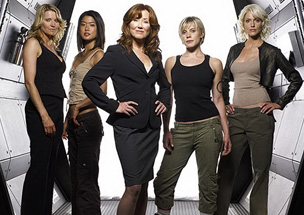Mythology: Battlestar Galactica
By Martin Felipe
July 30, 2009
Over the past decade or so, cable has become the prominent place for quality serialized story telling. All of the cable networks, which have risen to prominence in the respect department, have done so with the introduction of a flagship critical darling program. HBO had The Sopranos, FX gave us The Shield, AMC is plowing through awards shows with Mad Men, and what was once called The Sci-Fi Network finally got some attention with the remake of a cheesy '70s drama called Battlestar Galactica. Ron Moore and David Eick took the seed of inspiration from that creaky old space opera, stripped the concept of traditional science fiction tropes and conventions, and delivered to our homes a complex, gripping drama of survival and faith. Now that the final ten episodes are available to purchase, we can appreciate the entirety of Moore and Eick's take on Battlestar Galactica at our leisure, and without interminable waits between half-seasons.
Unlike most mythology show runners who claim to have the broad strokes - if not the episode-to-episode details - of their epic planned in advance, Moore and Eick make no bones of the fact that they made up the story as they went along. As a result of this approach, fans have developed somewhat of a love-hate relationship with the show as it entered its later half-seasons. Some plot threads seemed to lead to nothing. Inconvenient early storylines, which interfered with later developments, got pat, unsatisfying conclusions, and certain foreshadowing seemed to have little payoff.
The fact of the matter is that almost every show's final episode is greeted with controversy. Galactica is far from alone in this respect and, in my opinion, despite a quibble here and there, Moore and Eick do stick the proverbial landing. Pretty much all of the dangling threads get some degree of tying, we get closure on the many, many characters, answers to questions, and all the while the themes of survival and faith are preserved. While the show as a whole is brilliant, the conclusion, to me anyway, makes it one for the ages. And yet, a quibble or two remain.
It goes without saying, but I'll say it anyway. I'm about to discuss a few detailed developments of the finale. This is your spoiler warning.
Probably my biggest issue with the finale is the resolution of the Pythian Prophecy. The Prophecy tells of a leader suffering from a wasting disease who will lead a Caravan of the Heavens to the new homeland, but not live to enter it. One of the great rules of mythology storytelling is if there's a prophecy, it must come to pass, even if not in the way we've come to expect.
Now, I've gone over this many times in my head, but if Roslin is the dying leader and the Fleet is the Caravan, then according to the Prophecy, she should not live to enter the new homeland. Yet, she does. I've seen two explanations to this inconsistency which seem to work to some degree. The first is that she dies before reaching her new home with Adama. That's not bad. I could go with such an explanation. It's a semantics issue. She enters the new homeland of the Caravan of the Heavens but not her own.
Continued:
1
2
|
|
|
|




